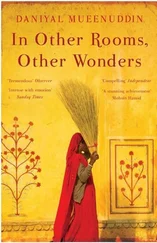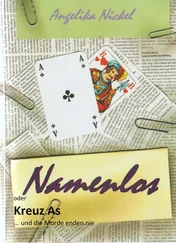“Stop!” Von Steigerwald’s Luger was pointed at the shabby man’s back. “Up with your hands, Lenny Spencer.”
The shabby man did. “You’re not German.” “Walk toward that car, slowly. If you walk fast, go for that gun under your coat, or even try to turn around, I’ll kill you.”
Twenty halting steps brought the shabby man to the nearest coach. Von Steigerwald made him lean against it, hands raised. “Your feet are too close,” he rasped when the shabby man was otherwise in position. “Move them back. Farther!”
“You might be English,” the shabby man said; his tone was conversational. “Might be, but I doubt it. Canadian?”
“American.”
The shabby man sighed. “That is exactly as I feared.” “You think President Kuhn has sent me because he wants you for himself?” Von Steigerwald pushed the muzzle of his Luger against the nape of the shabby man’s neck, not too hard.
“I do.”
Von Steigerwald’s left hand jerked back the shabby man’s coat and expertly extracted a large and rather old-fashioned pistol. “It would be out of the fire and into the frying pan for you, even if it were true.”
“I must hope so.”
“You can turn around and face me now, Mr. Churchill.” Von Steigerwald stepped back, smiling. “Is this the Mauser you used at Omdurman?”
Churchill shook his head as he straightened his shabby coat. “That is long gone. I took the one you’re holding from a man I killed. Killed today, I mean.”
“A German?”
Churchill nodded. “The officer of the guard. He was inspecting us—inspecting me, at the time. I happened to say something that interested him, he stayed to talk, and I was able to surprise him. May I omit the details?”
“Until later. Yes. We have no time to talk. We’re going back. I am still an S.S. officer. I still believe you to be an English traitor. I am borrowing you for a day or two—I require your service. They won’t be able to prevent us without revealing that you escaped them.” Von Steigerwald gave Churchill a smile that was charming and not at all cruel. “As you did yourself in speaking with me. They may shoot us. I think it’s much more likely that they’ll simply let us go, hoping I’ll return you without ever learning your identity.”
“And in America …?”
“In America, Donovan wants you, not Kuhn. Not the Bund. Donovan knows you.”
Slowly, Churchill nodded. “We met in …In forty-one, I think it was. Forty would’ve been an election year, and Roosevelt was already looking shaky in July—”
They were walking fast already, with Churchill a polite half-step behind; and Von Steigerwald no longer listened.
Aboard the fishing boat he had found for them, Potter cleared away what little food remained and shut the door of the tiny cabin. “Our crew—the old man and his son—don’t know who you are, Mr. Prime Minister. We’d prefer to keep it that way.”
Churchill nodded.
“If you’re comfortable …?”
He glanced at his cigar. “I could wish for better, but I realize you did the best you could. It will be different in America, or so I hope.”
Potter smiled. “It may even be different on the sub. I hope so, at least.”
Churchill looked at von Steigerwald, who glanced at his watch. “Midnight. We rendezvous at three AM, if everything goes well.”
Churchill grunted. “It never does.”
“This went well.” Potter was still smiling. “I know you two know everything, Mr. Prime Minister, but I don’t. How did he get you out?”
Still in uniform, Von Steigerwald straightened his tunic and brushed away an invisible speck of lint. “He got himself out, mostly. Killed an officer. He won’t tell me how.”
“Killing is a brutal business.” Churchill shook his head. “Even with sword or gun. With one’s hands …He trusted me. Or trusted my age, at least. Thought I could never overpower him, or that I would lack the will to try. If it was in my weakness he trusted, he was nearly right. It was, as Wellington said of a more significant victory, a near run thing. If it was in my fear, the captain mistook foe for friend. What had I to lose? I would have been put to death, and soon. Better to perish like a Briton.”
He pulled back his shabby coat to show the Mauser. “Perhaps it was seeing this. His holster covered most of it, but I could see the grip. Quite distinctive. Once upon a time, eh? Once upon a time, long before either of you saw light, I was a dashing young cavalry officer. Seeing this, I remembered.”
“The Germans have pressed every kind of pistol they can find into service,” von Steigerwald explained. “Even Polish and French guns.”
Churchill puffed his cigar and made a face. “What I wish to know is where I tripped up. Did you recognize me? The light was so bad, and I’d starved for so long, that I thought I could risk it. No cigar, eh? No bowler. Still wearing the clothes they took me in. So how did you know?”
“That you were Churchill? From your gun. I pulled it out of your waist band and thought, by god it’s a broom-handle Mauser. Churchill used one of these fifty years ago. I’d had a briefing on you, and I’d been interested in the gun. You bought it in Cairo.”
Churchill nodded.
“That was when it finally struck me that Spencer was your middle name. Your byline—I read some of your books and articles—was Winston S. Churchill.”
“You didn’t know about Leonard, then.” Churchill looked around for an ashtray and, finding none, tapped the ash from his cigar into a pocket of his shabby coat. “In full, my name is Winston Leonard Spencer Churchill. I should have been more careful about my alias. I had to think very quickly, though, and the only others I could seize on just then were John Smith and George Brown. Either, I felt, would have been less than convincing.”
Potter grinned. “Very.”
“In my own defense, I thought I was dealing with a German officer.” Churchill turned to von Steigerwald. “This isn’t what I wanted to inquire about, however.
How did you know I had been lying to you?”
“I wasn’t certain until I realized you were the man I’d been sent to rescue. A couple of things made me suspicious, and when I saw the bulge of your gun butt—”
“What were they?”
“Once you said ‘we’ in speaking of the prisoners,” von Steigerwald explained. “I said that the S.S. would make the prisoners eat their excrement, and you said, ‘No doubt we would.’ It sounded wrong, and when I thought about it, I realized that you couldn’t have been what you said you were—an Englishman working for the Germans. If you had been, they would have made you clean under the cars. Why did you confirm that you had been a prisoner when the Germans were denying they had him?”
“Ignorance. I didn’t know they were. I had walked for miles along those dark tracks, trying to find a way out. I couldn’t. All the tunnels ended in rubble and earth.”
“Flattened by bombs?” Potter asked.
Churchill nodded. “To get out, I was going to have to go out through the German headquarters, and I could think of no practical way of doing that. Then the colonel here came, plainly a visitor since he was S.S., not army, and because he had an escort. I hoped to attach myself to him, a knowledgeable, subservient Englishman who might inform on the commandant if he could be convinced it was safe. I would persuade him to take me with him, and when he did, I would be outside. Sergeant Lohr and any Germans in the headquarters would know who I was, of course. But if they were wise—if they spoke with the commandant first, certainly—they would let me go without a word. If they prevented me, the army would be blamed for my escape; but if they held their peace and let me go, they could report quite truthfully that I had been taken away by the S.S. With luck, they might even get the credit for my recapture later.”
Читать дальше












